【金榜课件——知识建构篇】(教师用书)2014高考英语二轮(考情前瞻+典题自测+热点考向+易错点拨)第二部分 句法 第5讲 情景交际(全部以2013高考真题、模拟题为例,82张ppt)
文档属性
| 名称 | 【金榜课件——知识建构篇】(教师用书)2014高考英语二轮(考情前瞻+典题自测+热点考向+易错点拨)第二部分 句法 第5讲 情景交际(全部以2013高考真题、模拟题为例,82张ppt) | 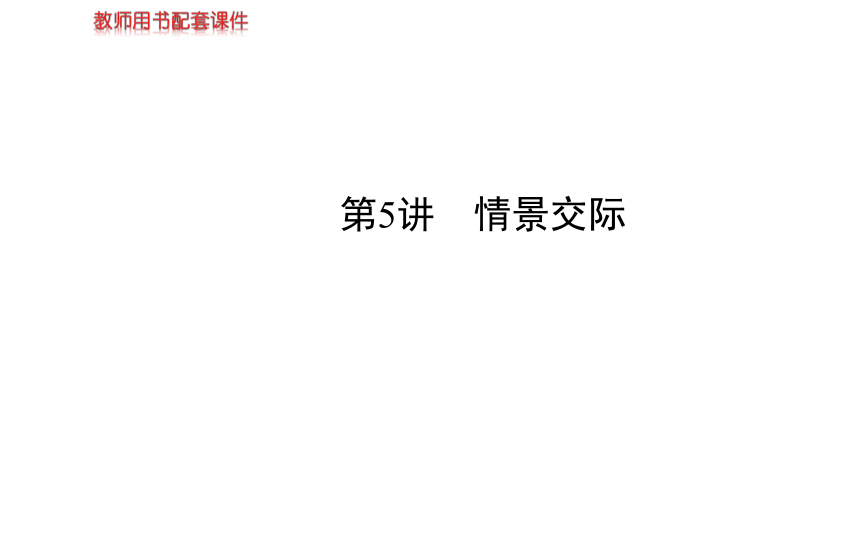 | |
| 格式 | zip | ||
| 文件大小 | 4.4MB | ||
| 资源类型 | 教案 | ||
| 版本资源 | |||
| 科目 | 英语 | ||
| 更新时间 | 2014-03-12 20:45:37 | ||
图片预览

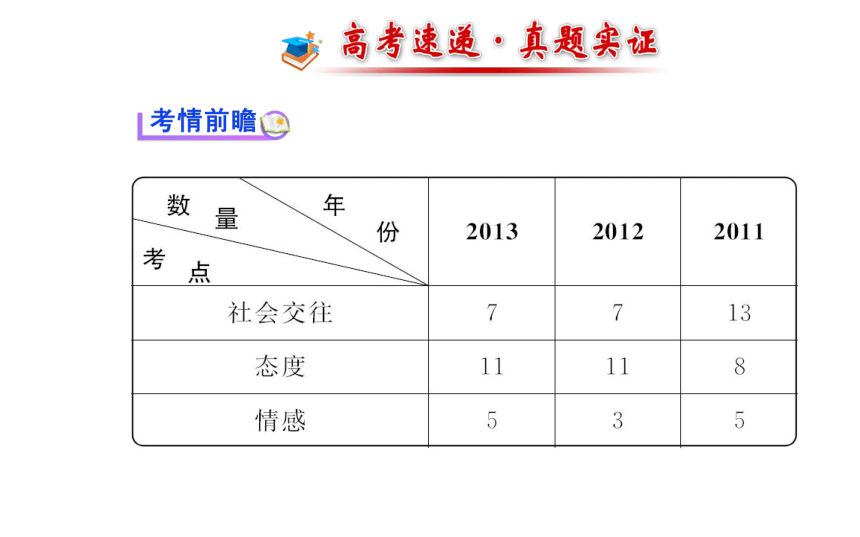
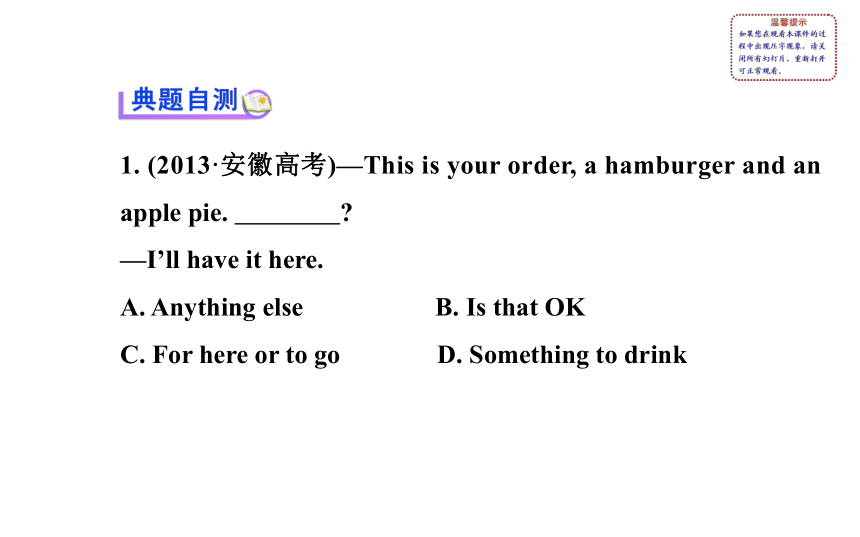
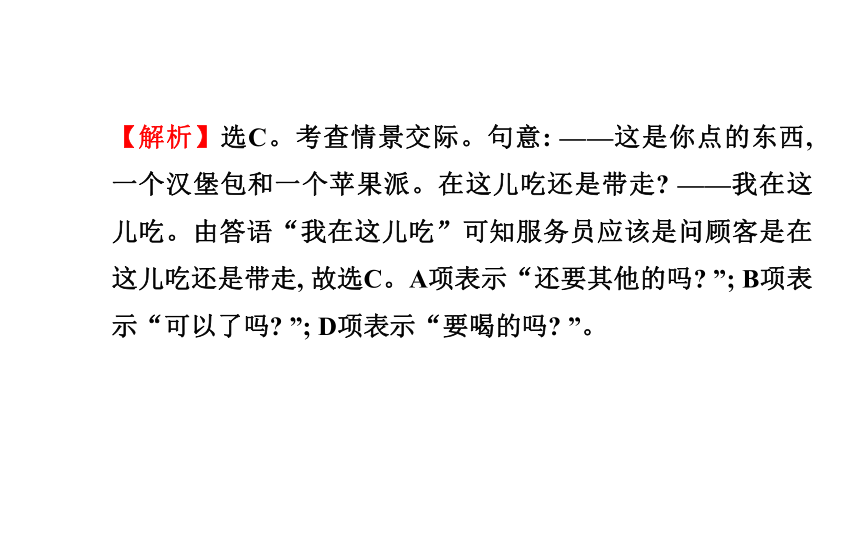
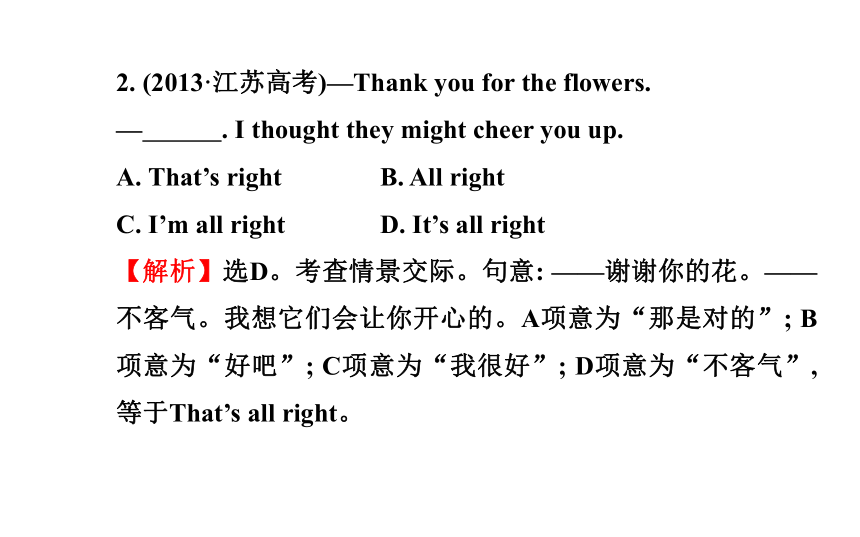
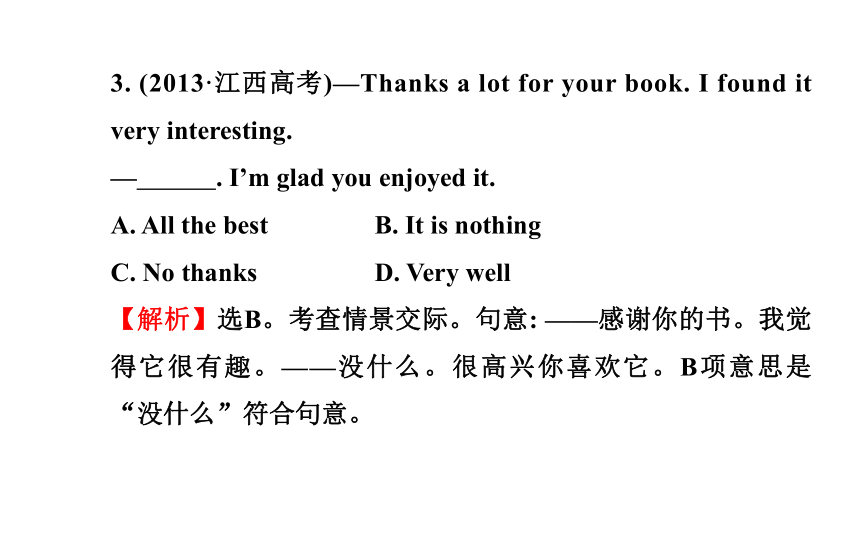

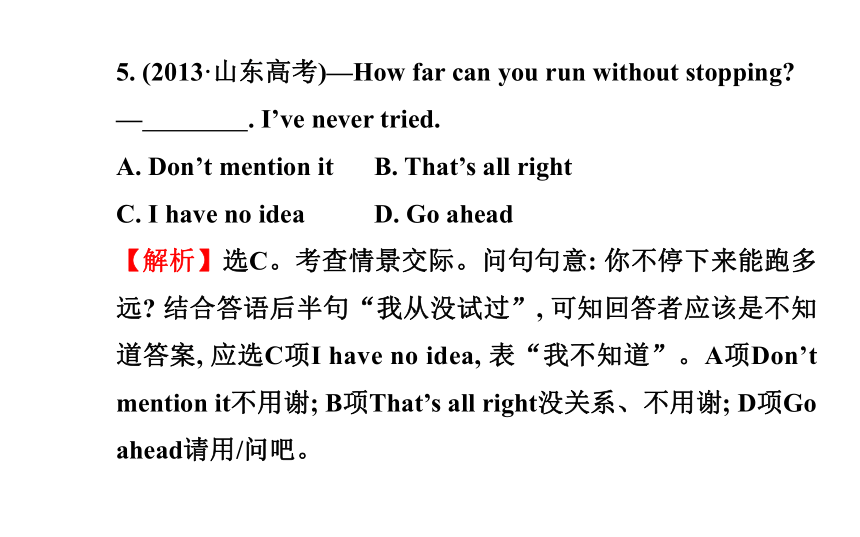
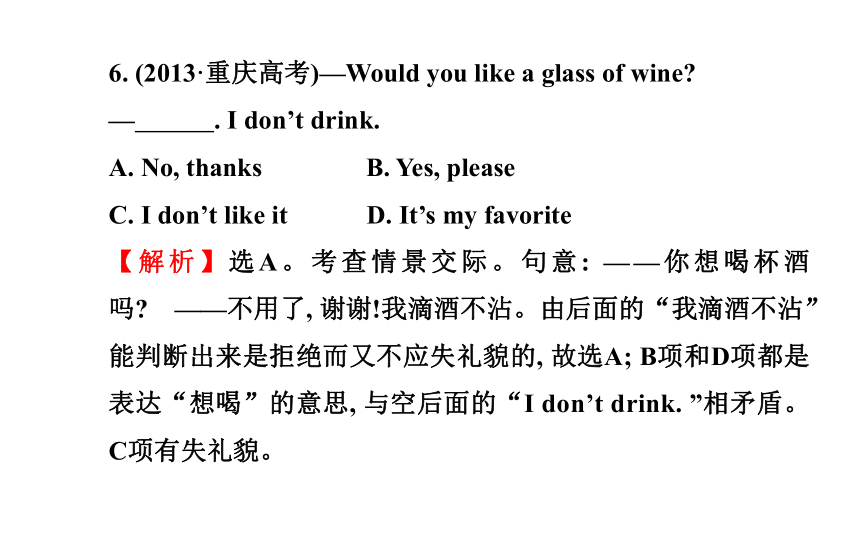
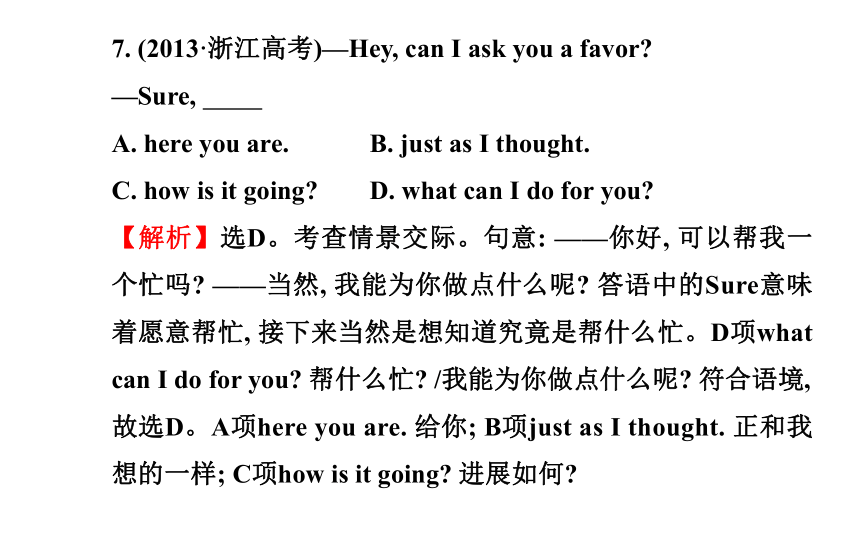
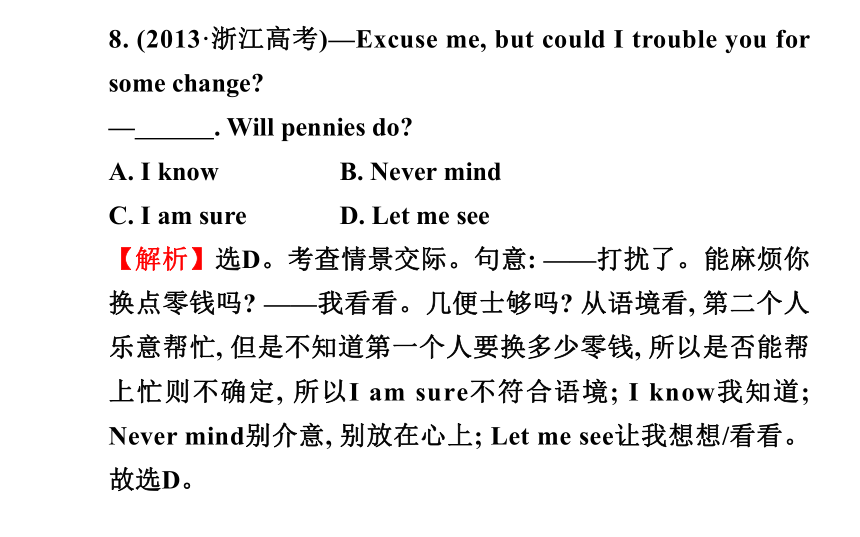
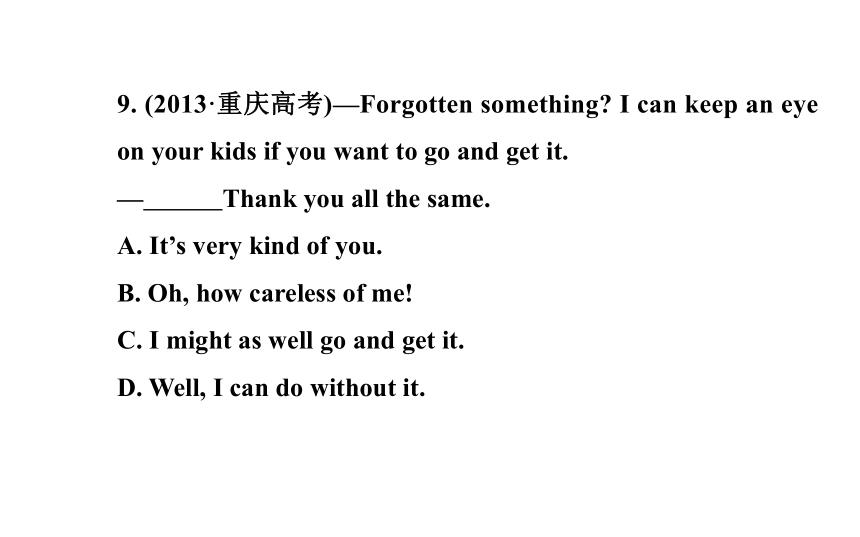
文档简介
课件82张PPT。第5讲 情景交际1. (2013·安徽高考)—This is your order, a hamburger and an apple pie. ?
—I’ll have it here.
A. Anything else B. Is that OK
C. For here or to go D. Something to drink【解析】选C。考查情景交际。句意: ——这是你点的东西, 一个汉堡包和一个苹果派。在这儿吃还是带走? ——我在这儿吃。由答语“我在这儿吃”可知服务员应该是问顾客是在这儿吃还是带走, 故选C。A项表示“还要其他的吗? ”; B项表示“可以了吗? ”; D项表示“要喝的吗? ”。2. (2013·江苏高考)—Thank you for the flowers.
— . I thought they might cheer you up.
A. That’s right B. All right
C. I’m all right D. It’s all right
【解析】选D。考查情景交际。句意: ——谢谢你的花。——不客气。我想它们会让你开心的。A项意为“那是对的”; B项意为“好吧”; C项意为“我很好”; D项意为“不客气”, 等于That’s all right。3. (2013·江西高考)—Thanks a lot for your book. I found it very interesting.
— . I’m glad you enjoyed it.
A. All the best B. It is nothing
C. No thanks D. Very well
【解析】选B。考查情景交际。句意: ——感谢你的书。我觉得它很有趣。——没什么。很高兴你喜欢它。B项意思是“没什么”符合句意。4. (2013·新课标全国卷Ⅰ)—Why, this is nothing but common vegetable soup!
— , madam. It’s our soup of the day.
A. Let me see B. So it is
C. Don’t mention it D. Neither do I
【解析】选B。考查情景交际。句意: ——怎么, 这不就是普通蔬菜汤吗? ——就是啊, 女士。这是我们今天的汤。A项表示“让我来看看”; B项表示“确实是”; C项表示“区区小事何足挂齿”; D项表示“我也不”。5. (2013·山东高考)—How far can you run without stopping?
— . I’ve never tried.
A. Don’t mention it B. That’s all right
C. I have no idea D. Go ahead
【解析】选C。考查情景交际。问句句意: 你不停下来能跑多远? 结合答语后半句“我从没试过”, 可知回答者应该是不知道答案, 应选C项I have no idea, 表“我不知道”。A项Don’t mention it不用谢; B项That’s all right没关系、不用谢; D项Go ahead请用/问吧。6. (2013·重庆高考)—Would you like a glass of wine?
— . I don’t drink.
A. No, thanks B. Yes, please
C. I don’t like it D. It’s my favorite
【解析】选A。考查情景交际。句意: ——你想喝杯酒吗? ——不用了, 谢谢!我滴酒不沾。由后面的“我滴酒不沾”能判断出来是拒绝而又不应失礼貌的, 故选A; B项和D项都是表达“想喝”的意思, 与空后面的“I don’t drink. ”相矛盾。C项有失礼貌。7. (2013·浙江高考)—Hey, can I ask you a favor?
—Sure, ?
A. here you are. B. just as I thought.
C. how is it going? D. what can I do for you?
【解析】选D。考查情景交际。句意: ——你好, 可以帮我一个忙吗? ——当然, 我能为你做点什么呢? 答语中的Sure意味着愿意帮忙, 接下来当然是想知道究竟是帮什么忙。D项what can I do for you? 帮什么忙? /我能为你做点什么呢? 符合语境, 故选D。A项here you are. 给你; B项just as I thought. 正和我想的一样; C项how is it going? 进展如何? 8. (2013·浙江高考)—Excuse me, but could I trouble you for some change?
— . Will pennies do?
A. I know B. Never mind
C. I am sure D. Let me see
【解析】选D。考查情景交际。句意: ——打扰了。能麻烦你换点零钱吗? ——我看看。几便士够吗? 从语境看, 第二个人乐意帮忙, 但是不知道第一个人要换多少零钱, 所以是否能帮上忙则不确定, 所以I am sure不符合语境; I know我知道; Never mind别介意, 别放在心上; Let me see让我想想/看看。故选D。9. (2013·重庆高考)—Forgotten something? I can keep an eye on your kids if you want to go and get it.
— Thank you all the same.
A. It’s very kind of you.
B. Oh, how careless of me!
C. I might as well go and get it.
D. Well, I can do without it. 【解析】选D。考查情景交际。句意: ——忘东西了吗? 如果你想去取的话我可以帮你看孩子。——哦, 没有也行。仍然谢谢你。根据后面的“Thank you all the same. ”可以推断是拒绝了对方的好意, 故选D; A项的“你真好!”以及B项的“哦, 我太粗心了!”和C项的“我最好去取。”都与拒绝对方的好意不一致。10. (2013·安徽高考)—How did your interview with the manager go?
— He seemed interested in my experience, but he didn’t ask for references.
A. Perfect! B. I’m not sure.
C. That’s right. D. Couldn’t be better. 【解析】选B。考查交际用语。句意: ——你和经理的面试进展如何? ——我不确定。他似乎对我的阅历感兴趣, 但却没要我的推荐信。由答语可知说话者对所问问题是不确定的, 故选B。Perfect!很完美!That’s right. 那是对的; Couldn’t be better. 再好不过了。11. (2013·福建高考)—Would you mind answering some questions on shopping habits?
— .
A. Yes, with great pleasure
B. No, I am afraid I can’t make it
C. Yes, it is worth the time
D. No, as long as it doesn’t take long【解析】选D。考查交际用语。句意: ——你介意回答一些关于购物习惯的问题吗? ——不介意, 只要不花太长时间。A、B、C三项的答语均自相矛盾, 故选D。12. (2013·辽宁高考)—What do you think of the house?
— It’s everything we’ve been looking for.
A. Perfect! B. Good idea!
C. Not bad. D. So-so.
【解析】选A。考查情景交际。句意: ——你认为这所房子怎么样? ——太棒了!这就是我们一直在找的。从最后一句“这正是我们一直在找的”可知答话人对房子很满意。A项“太好了!太完美了!”符合句意。B项“好主意”; C项“不错, 很好”; D项“一般”。13. (2013·新课标全国卷Ⅱ)—Are you sure you won’t come for a drink with us?
— , if you insist.
A. Not at all B. It depends
C. All right then D. I don’t care
【解析】选C。考查情景交际。句意: ——你确定不和我们去喝酒了? ——那么好吧, 如果你坚持让我去。A项表示“一点也不, 不必客气”; B项表示“视情况而定”; C项表示“好吧, 行”; D项表示“我不介意”。根据句意可知选C。14. (2013·山东高考)—This is a really lively party. There’s a great atmosphere, isn’t there?
— . The hosts know how to host a party.
A. Don’t worry B. Yes, indeed
C. No, there isn’t D. It all depends
【解析】选B。考查情景交际。前半句句意: 这真是一个非常热闹的聚会。气氛很好, 不是吗? 结合答语后句“主人们知道如何举办一个聚会”可知, 应该是对前者看法的肯定, 所以选B。Yes, indeed是的, 确实如此。A项Don’t worry别担心; C项No, there isn’t不, 没有; D项It all depends依情况而定, 均不符合语境, 故选B。15. (2013·陕西高考)—I’m tired. I’m taking next week off.
— , honey. You do need a break.
A. Not so sure B. Forget it
C. Great idea D. No way
【解析】选C。考查情景交际。句意: ——我累了, 下周要休假。——好主意, 亲爱的。你的确需要休息了。A不是那么确定; B算了吧, 没关系, 休想; C好主意; D没门, 决不。根据句意, 应选C。16. (2013·陕西高考)—Shall we go for a drink at one o’clock this afternoon?
— . Will two o’clock be OK?
A. Sure, it’s up to you
B. Sure, no problem
C. Sorry, I can’t make it
D. Sorry, I’m not available today【解析】选C。考查情景交际。句意: ——今天下午一点我们出去喝一杯好吗? ——对不起, 我那时恐怕没有时间。两点好吗? I can’t make it. 我做不到。it’s up to you由你来决定; no problem没问题; I’m not available today. 我今天没空。根据句意, 选C。17. (2013·天津高考)—Mary’s been offered a job in a university, but she doesn’t want to take it.
— ? It’s a very good chance.
A. Guess what B. So what
C. Who cares D. But why
【解析】选D。考查情景交际。句意: ——有人给玛丽提供了一份在大学里的工作, 但是她不想接受这份工作。——但是为什么啊? 那是一个非常好的机会。A项猜猜发生了什么? B项那又怎么样? C项谁在乎? D项但是为什么? 根据句意应选D。18. (2013·江苏高考)—The T-shirt I received is not the same as is shown online.
— ? But I promise you we’ll look into it right away.
A. Who says B. How come
C. What for D. Why worry
【解析】选B。考查交际用语。句意: ——我收到的这件T恤衫和网上展示的不一样。——怎么可能呢? 我向你承诺我们将立刻调查此事。A项“谁说的”; B项“怎么可能呢”, 此处表示吃惊, 符合语境; C项“为什么”; D项“为何担心呢”。19. (2013·辽宁高考)—I’m afraid you have the wrong number.
—Sorry! .
A. See you later
B. I didn’t know that
C. Hold on, please
D. I hope I didn’t bother you
【解析】选D。考查情景交际。句意: ——恐怕你拨错号码了。——对不起!希望没有打扰你。A项“再见”; B项“我不知道”; C项“请稍等”; D项“希望没有打扰你”。20. (2013·新课标全国卷Ⅱ)—I’m sorry I made a mistake!
— . Nobody is perfect.
A. Take your time B. You’re right
C. Whatever you say D. Take it easy
【解析】选D。考查情景交际。句意: ——对不起, 我犯错了!——不要紧张。人无完人。A项表示“慢慢来”; B项表示“你是对的”; C项表示“无论你说什么”; D项表示“放松, 别着急”。根据语境可知选D。热点考向 1 社会交往?
1. 感谢与应答:
(1)感谢
Thank you(very much for. . . )
Thanks a lot.
Many thanks. (2)应答
That’s all right. /Thanks for helping me.
You’re welcome. /That’s OK. /Not at all.
It’s my pleasure. /Don’t mention it.
It’s nothing. /Think nothing of it.
Forget it. 2. 道歉与应答:
(1)道歉
I’m sorry. /I apologize for. . . /Forgive sb. for. . .
I’m sorry to trouble you.
I’m sorry to have kept you waiting.
(2)应答
It doesn’t matter. /It’s not important. /That’s/It’s nothing.
Not at all. /Never mind. /That’s all right.
Forget it. /That’s OK. /No problem. 3. 劝告、建议与应答:
(1)劝告和建议
I think you ought to. . .
If I were you, I’d. . .
It might be a good idea if you. . .
Have you ever thought of. . . ?
I recommend that. . .
I strongly advise you to. . . You really ought to. . .
Personally, I think you’d better. . .
Why not do. . . ?
Why don’t you do. . . ?
I suggest that. . .
What about doing. . . ?
How about doing. . . ?
Shall we. . . ?
Let’s. . . , shall we?
You need(to). . . (2)应答
Good idea. /That’s great. /Sounds great. /It sounds great.
That’s fine. /Why not? /I’d love to, but. . .
I’m afraid. . . /It’s an idea, but. . . 4. 请求允许与应答:
(1)请求允许
May I. . . ? /Can I. . . ? /Could I. . . ?
Do you mind if I. . . /I wonder if you can. . .
(2)应答
With pleasure. /Certainly(Of course).
Sure, go ahead. /Yes, help yourself.
Of course not, go ahead(回答Do you mind if I. . . )
All right. /I will. /I’m afraid not. /Better not.
I’d rather you didn’t. /No way. /Forget it. 5. 邀请与应答:
(1)邀请
Would you like to. . . ? /Why don’t we. . . ?
Will you come to. . . ? /I wonder if. . .
(2)应答
That would be fine.
That’s very kind of you.
All right. /Sounds great/good.
Yes, I’d love to. /Why not? /I’d love to, but. . .
Sorry, I can’t. /I’m afraid I can’t. 6. 提供帮助与应答:
(1)提供帮助
Can I help you? /What can I do for you?
Would you like me to help you?
Do you want me to. . . /Let me. . .
(2)应答
Yes, please.
Thank you for your help. /Thanks.
No, thank you/thank you all the same.
That’s very kind of you, but. . . 7. 祝愿、祝贺与应答:
(1)祝愿、祝贺
Good luck!/Best wishes to you.
Have a nice/good time/journey.
Congratulations!/Happy New Year!
Merry Christmas!/Happy birthday to you. (2)应答
Thank you!/The same to you. /You, too.
—Happy New Year! (Merry Christmas!)
—The same to you. (You, too. ) 8. 鼓励、赞扬与应答:
(1)鼓励、赞扬
Very good. /Well done. /Wonderful. /Excellent.
Come on. /Keep trying. /You can do it.
(2)应答
Thank you. /OK. /I’ll try it again. 【真题变式】选择合适的答语(请把答语的字母代号填到括号
里面)。
①(2012·安徽高考)—May I help you? You seem to be having
some problems. ( )
②(2012·山东高考)—Sorry I’m late. I got stuck in traffic. ( )
③(2012·陕西高考)—I’m sorry for being late. I should have
phoned you earlier. ( )CAD④(2012·天津高考)—Can I have a day off tomorrow, Mr. Johnson? ( )
⑤(2012·全国卷Ⅱ)—What shall we do tonight then? ( )
A. Never mind. You’re here now. Come in and sit down.
B. It’s up to you—whatever you want.
C. It’s all right, thanks. I think I can manage.
D. That’s all right. I’ve just arrived.
E. Of course. I can manage without you. EB热点考向 2 态度?
1. 表示同意。
I quite agree. /I couldn’t agree more. /Exactly.
Certainly. /Absolutely. /Of course. /All right.
That’s a good idea. /No problem. /I think so.
2. 表示不同意。
Not really. /Not Exactly. /I don’t quite agree.
I don’t think so. /I’m afraid not. /It’s hard to say.
Well, that depends. /No way. /Of course not. 3. 表示不在乎。
So what? /Who cares?
4. 表示肯定。
I’m sure. /I’m sure that. . . /That’s for sure.
By no means. /No doubt.
There’s no doubt(question)about it.
It must be. /I dare say.
5. 表示不肯定。
I’m not sure. I’m not sure whether/if. . .
Perhaps. /Maybe. /It/That(all)depends. 【真题变式】根据所给汉语完成句子。
①(2012·重庆高考)—The Modern Art Exhibition in the City Museum has been cancelled.
—Oh, no! (太可惜了).
答案: It’s a pity/What a pity②(2012·山东高考)—I don’t know about you, but I’m sick and tired of this weather.
— (我也是). I can’t stand all this rain.
答案: So am I③(2012·福建高考)—What are you going to do this weekend?
— (看情况再说吧). If time permits, I may go to Shanghai with my friends.
答案: It/That(all)depends. 【命题小试】
请根据以下内容命制一道考查情景交际的题目。 —Do you think I could borrow your tape recorder? —Yes, help yourself. 【参考答案】—Do you think I could borrow your tape recorder? — ? A. How come? B. Take your time. C. Yes, go on. D. Yes, help yourself. 【解析】选D。考查情景交际。句意: ——我能借你的录音机吗? ——好的, 请随便。此处Yes, help yourself是表示“同意”的一种表达。表示同意的用语还有“Certainly/Exactly/Sure/Of course. /I agree. /No problem. /That’s exactly what I was thinking. ”等。热点考向 3 情感
1. 表示惊奇。
Really? /How come? /What a surprise!/Oh, dear!
Good heavens!
2. 表示同情。
I’m sorry to hear that. /Don’t worry. /What a pity!
That’s really unlucky. /Bad luck. 3. 表示安慰。
Don’t worry. /Don’t be afraid. /Take your time.
Take it easy. /Make yourself at home.
It’s quite all right. /It’ll be OK. 【真题变式】根据所给汉语完成句子。
①(2012·江苏高考)—Don’t worry, Mum. The doctor said it was only the flu.
— (这下松了一口气)!I’ll tell Dad there’s nothing serious.
答案: What a relief
②(2012·浙江高考)—I’m going to San Francisco for a couple of days.
— (我真羡慕你). I wish I could get away for a while.
答案: I really envy you易错点 1 忽视英汉差异导致的误判?
1. —It’s getting late. I’m afraid I must be going now.
—OK. .
A. Take it easy B. Go slowly
C. Stay longer D. See you
【易错分析】本题易误选B, 因为在中国, 送客时通常说“请慢走”。【解析】选D。考查情景交际。句意: ——天晚了, 恐怕我现在必须走了。——好的, 再见。客人要走, 主人说OK, 表明同意, 接下来应当是“再见”, 故选D项。Take it easy别着急; Stay longer再过一会儿, 均与语境不符。2. (2013·济南模拟)—Could I borrow the book by Mo Yan?
— .
A. By all means B. You’re welcome
C. Yes, you could D. I am afraid so
【解析】选A。考查情景交际。A项意为当然可以; B项意为不客气; C项应该是Yes, you can. D项意为恐怕是这样的。此题易误选C项, 在回答同意对方的请求时, 可以使用can/may, 但是不能使用could/might。【误区点拨】
①解答此类题目的关键是了解中英两种文化的差异, 弄清楚中英文交际习惯的方式。
②解题时要认真分析语境, 结合所学惯用表达法做出正确的选择。易错点 2 受思维定势制约导致的误判?
1. —Sorry, I couldn’t come to the party. I was sick that day.
— .
A. I don’t know that
B. That’s all right
C. Yes, we’ll have another party
D. No, the party wasn’t held
【解析】选B。此处That’s all right意为没关系, 是对他人道歉的一种应答。2. —My daughter has passed the driving test.
—Congratulations! She’s really intelligent.
— .
A. No, no, she is nothing
B. Oh, thank you
C. Sometimes she is intelligent
D. You are right
【解析】选B。当得到对方的祝贺/赞美/表扬时, 常用Thank you回答。3. —Would you please come to my birthday party this weekend?
— .
A. Yes, I would B. My pleasure
C. Sorry, I wouldn’t D. Certainly, I will
【易错分析】本题易误选A或C, 以为用would的一般疑问句就用would或wouldn’t来作肯定或否定回答。【解析】选D。考查情景交际。句意: ——这周末来参加我的生日宴会好吗? ——当然可以了, 我会来的。选项A和C不符合英语习惯; 选项B意为“不用谢, 别客气”, 不符合语境。故选D。【误区点拨】
①解答此类题目的关键是排除思维定势的干扰。
②牢记情景交际常用表达方式, 认真分析语境有助于此类题目的解决。
③平时要尽量多了解一些英语国家的风土人情、生活习惯, 注意归纳、总结和积累习惯上的差异, 熟悉并能正确运用所学惯用法。1. (2013·合肥模拟)Please write on both sides of the paper— .
A. Many hands make quick work
B. Much coin, much care
C. Waste not, want not
D. Of nothing comes nothing【解析】选C。考查交际用语。句意: 请在纸的双面写字——不浪费, 不匮乏。Many hands make quick work人多办事快; Much coin, much care钱多忧虑多; Waste not, want not不浪费, 不匮乏; Of nothing comes nothing无中生有; 根据上下文选C。2. —I’m sorry, Sir. I got stuck in the heavy snow on the way to work this morning.
— you were so late. It is none of your business.
A. Go ahead B. Forget it
C. No wonder D. No way
【解析】选C。考查情景交际。句意: ——很抱歉, 先生, 我今早在上班途中被大雪困住了。——难怪你迟到了。那不是你的错。go ahead意为“继续”; forget it意为“没关系; 算了”; no wonder意为“难怪”; no way意为“没门”。3. —Can I look at the menu for a few more minutes before I order?
—Of course. , Sir.
A. Make yourself at home B. At your service
C. Take your time D. It doesn’t matter
【解析】选C。考查情景交际。句意: ——我点菜之前可以再看几分钟菜单吗? ——当然, 不着急, 先生。此处第一句表示征求对方许可, 故排除D项; A项意为“别拘束, 随便”; B项意为“听候吩咐”; C项意为“(时间足够)不着急”; D项表示“没有关系”。根据上下文语境, 此处使用take your time。4. —What do you want to do next? We have half an hour before the basketball game starts.
— . Whatever you want to do is fine with me.
A. It all depends B. It’s up to you
C. All right D. That’s all right
【解析】选B。考查情景交际。根据下文的Whatever you want to do is fine with me. 可知此题选B项。5. —I was really anxious about you. You shouldn’t have left without a word that day.
— ?
A. Why not? B. Really?
C. I don’t know. D. I’m terribly sorry.
【解析】选D。考查情景交际。I’m terribly sorry. 表示道歉。6. (2013·福州模拟)—Hello, Mrs. James, is Sally at home? I want to play badminton with her.
— . She’s gone for a walk across the fields.
A. I’m sorry B. Hold on
C. No Problem D. Forget it
【解析】选A。考查情景交际。此处表示要找的人不在, 理应表示歉意, 故使用I’m sorry。7. —Will you complete the task in time?
—Sure, I will. .
A. Everything is possible
B. But it’s too hard
C. No matter what will happen
D. Though it’s a piece of cake
【解析】选C。考查情景交际。此处答语部分相当于Sure, I will complete the task in time, no matter what will happen。No matter what will happen是一个让步状语从句。8. —It took me twenty years to build up my business, and it almost killed me.
—Well, you know what they say. .
A. There is no smoke without fire
B. Practice makes perfect
C. All roads lead to Rome
D. No pains, no gains
【解析】选D。考查情景交际。根据一方所陈述的“花了我二十年时间成就事业, 费了不少劲”可知, 另一方则表达了观点“不劳无获(No pains, no gains)”。9. —May I try the jacket on?
— , but I think it will be too small for you.
A. As you like B. By all means
C. As a result D. Believe it or not
【解析】选B。考查情景交际。此处习语By all means表示“完全可以”。10. —Hi, Sam. I’m going to take a long walk along the sunny beach and go swimming today.
— !
A. How nice you are B. That’s all right
C. Sounds great D. Good exercise
【解析】选C。考查情景交际。句意: ——嗨, 萨姆, 我今天打算沿阳光沙滩散步并游泳。——听起来很好!此处Sounds great表示对上面所说的话表示肯定。11. —It’s been raining for a whole week. I think it’ll get fine soon.
— . We are getting into the rainy season now.
A. Yes, it will B. Of course not
C. It’s possible D. It’s hard to say
【解析】选D。考查情景交际。一方认为“天很快会转晴”, 另一方则表示一种“不肯定”的看法: 很难说(It’s hard to say. )。12. —Do you mind if I open the door?
— . I feel a bit cold.
A. Of course not B. I’d rather you didn’t
C. Go ahead D. Please close it
【解析】选B。考查回答Do you mind if. . . 的用语, “我宁愿你别开”。13. (2013·哈尔滨模拟)—It was announced that another student in our school had won the first prize for China High School Chemistry Olympiad.
—Oh, really? He must have put a lot of work into it.
A. That sounds fine. B. That’s quite something.
C. That’s a good point. D. Get a move on.
【解析】选B。考查情景交际。句意: ——据宣布我校的另一名学生获得了中国中学生化学奥林匹克竞赛一等奖。——噢, 真的吗? 真了不起, 他肯定是投入了大量的精力。That’s quite something. 表示对上面所说情况的赞扬和肯定, 此处可译为“真了不起”。14. —I’m not good at table tennis, you know.
— We’re playing for fun. Just try and you’ll see you can do it.
A. Well, it depends. B. Take your time.
C. Come on! D. That’s OK.
【解析】选C。考查情景交际。A项意为“好的, 看情况而定”; B项意为“别着急”; C项意为“(用于鼓励他人)来吧”; D项意为“好的”。根据上下文, 此处应用Come on。15. (2013·西安模拟)—Ken, , but your radio is going too loud.
—Oh, I’m sorry. I’ll turn it down right now.
A. it doesn’t hurt to ask B. I’m crazy about it
C. I’m really tired of it D. I hate to say it
【解析】选D。考查情景交际。I hate to say it后面多跟but, 句意为“我很不想说(这句话)”, 符合上下文语境。(十三)(十四)六大技巧规避单项填空命题陷阱
—I’ll have it here.
A. Anything else B. Is that OK
C. For here or to go D. Something to drink【解析】选C。考查情景交际。句意: ——这是你点的东西, 一个汉堡包和一个苹果派。在这儿吃还是带走? ——我在这儿吃。由答语“我在这儿吃”可知服务员应该是问顾客是在这儿吃还是带走, 故选C。A项表示“还要其他的吗? ”; B项表示“可以了吗? ”; D项表示“要喝的吗? ”。2. (2013·江苏高考)—Thank you for the flowers.
— . I thought they might cheer you up.
A. That’s right B. All right
C. I’m all right D. It’s all right
【解析】选D。考查情景交际。句意: ——谢谢你的花。——不客气。我想它们会让你开心的。A项意为“那是对的”; B项意为“好吧”; C项意为“我很好”; D项意为“不客气”, 等于That’s all right。3. (2013·江西高考)—Thanks a lot for your book. I found it very interesting.
— . I’m glad you enjoyed it.
A. All the best B. It is nothing
C. No thanks D. Very well
【解析】选B。考查情景交际。句意: ——感谢你的书。我觉得它很有趣。——没什么。很高兴你喜欢它。B项意思是“没什么”符合句意。4. (2013·新课标全国卷Ⅰ)—Why, this is nothing but common vegetable soup!
— , madam. It’s our soup of the day.
A. Let me see B. So it is
C. Don’t mention it D. Neither do I
【解析】选B。考查情景交际。句意: ——怎么, 这不就是普通蔬菜汤吗? ——就是啊, 女士。这是我们今天的汤。A项表示“让我来看看”; B项表示“确实是”; C项表示“区区小事何足挂齿”; D项表示“我也不”。5. (2013·山东高考)—How far can you run without stopping?
— . I’ve never tried.
A. Don’t mention it B. That’s all right
C. I have no idea D. Go ahead
【解析】选C。考查情景交际。问句句意: 你不停下来能跑多远? 结合答语后半句“我从没试过”, 可知回答者应该是不知道答案, 应选C项I have no idea, 表“我不知道”。A项Don’t mention it不用谢; B项That’s all right没关系、不用谢; D项Go ahead请用/问吧。6. (2013·重庆高考)—Would you like a glass of wine?
— . I don’t drink.
A. No, thanks B. Yes, please
C. I don’t like it D. It’s my favorite
【解析】选A。考查情景交际。句意: ——你想喝杯酒吗? ——不用了, 谢谢!我滴酒不沾。由后面的“我滴酒不沾”能判断出来是拒绝而又不应失礼貌的, 故选A; B项和D项都是表达“想喝”的意思, 与空后面的“I don’t drink. ”相矛盾。C项有失礼貌。7. (2013·浙江高考)—Hey, can I ask you a favor?
—Sure, ?
A. here you are. B. just as I thought.
C. how is it going? D. what can I do for you?
【解析】选D。考查情景交际。句意: ——你好, 可以帮我一个忙吗? ——当然, 我能为你做点什么呢? 答语中的Sure意味着愿意帮忙, 接下来当然是想知道究竟是帮什么忙。D项what can I do for you? 帮什么忙? /我能为你做点什么呢? 符合语境, 故选D。A项here you are. 给你; B项just as I thought. 正和我想的一样; C项how is it going? 进展如何? 8. (2013·浙江高考)—Excuse me, but could I trouble you for some change?
— . Will pennies do?
A. I know B. Never mind
C. I am sure D. Let me see
【解析】选D。考查情景交际。句意: ——打扰了。能麻烦你换点零钱吗? ——我看看。几便士够吗? 从语境看, 第二个人乐意帮忙, 但是不知道第一个人要换多少零钱, 所以是否能帮上忙则不确定, 所以I am sure不符合语境; I know我知道; Never mind别介意, 别放在心上; Let me see让我想想/看看。故选D。9. (2013·重庆高考)—Forgotten something? I can keep an eye on your kids if you want to go and get it.
— Thank you all the same.
A. It’s very kind of you.
B. Oh, how careless of me!
C. I might as well go and get it.
D. Well, I can do without it. 【解析】选D。考查情景交际。句意: ——忘东西了吗? 如果你想去取的话我可以帮你看孩子。——哦, 没有也行。仍然谢谢你。根据后面的“Thank you all the same. ”可以推断是拒绝了对方的好意, 故选D; A项的“你真好!”以及B项的“哦, 我太粗心了!”和C项的“我最好去取。”都与拒绝对方的好意不一致。10. (2013·安徽高考)—How did your interview with the manager go?
— He seemed interested in my experience, but he didn’t ask for references.
A. Perfect! B. I’m not sure.
C. That’s right. D. Couldn’t be better. 【解析】选B。考查交际用语。句意: ——你和经理的面试进展如何? ——我不确定。他似乎对我的阅历感兴趣, 但却没要我的推荐信。由答语可知说话者对所问问题是不确定的, 故选B。Perfect!很完美!That’s right. 那是对的; Couldn’t be better. 再好不过了。11. (2013·福建高考)—Would you mind answering some questions on shopping habits?
— .
A. Yes, with great pleasure
B. No, I am afraid I can’t make it
C. Yes, it is worth the time
D. No, as long as it doesn’t take long【解析】选D。考查交际用语。句意: ——你介意回答一些关于购物习惯的问题吗? ——不介意, 只要不花太长时间。A、B、C三项的答语均自相矛盾, 故选D。12. (2013·辽宁高考)—What do you think of the house?
— It’s everything we’ve been looking for.
A. Perfect! B. Good idea!
C. Not bad. D. So-so.
【解析】选A。考查情景交际。句意: ——你认为这所房子怎么样? ——太棒了!这就是我们一直在找的。从最后一句“这正是我们一直在找的”可知答话人对房子很满意。A项“太好了!太完美了!”符合句意。B项“好主意”; C项“不错, 很好”; D项“一般”。13. (2013·新课标全国卷Ⅱ)—Are you sure you won’t come for a drink with us?
— , if you insist.
A. Not at all B. It depends
C. All right then D. I don’t care
【解析】选C。考查情景交际。句意: ——你确定不和我们去喝酒了? ——那么好吧, 如果你坚持让我去。A项表示“一点也不, 不必客气”; B项表示“视情况而定”; C项表示“好吧, 行”; D项表示“我不介意”。根据句意可知选C。14. (2013·山东高考)—This is a really lively party. There’s a great atmosphere, isn’t there?
— . The hosts know how to host a party.
A. Don’t worry B. Yes, indeed
C. No, there isn’t D. It all depends
【解析】选B。考查情景交际。前半句句意: 这真是一个非常热闹的聚会。气氛很好, 不是吗? 结合答语后句“主人们知道如何举办一个聚会”可知, 应该是对前者看法的肯定, 所以选B。Yes, indeed是的, 确实如此。A项Don’t worry别担心; C项No, there isn’t不, 没有; D项It all depends依情况而定, 均不符合语境, 故选B。15. (2013·陕西高考)—I’m tired. I’m taking next week off.
— , honey. You do need a break.
A. Not so sure B. Forget it
C. Great idea D. No way
【解析】选C。考查情景交际。句意: ——我累了, 下周要休假。——好主意, 亲爱的。你的确需要休息了。A不是那么确定; B算了吧, 没关系, 休想; C好主意; D没门, 决不。根据句意, 应选C。16. (2013·陕西高考)—Shall we go for a drink at one o’clock this afternoon?
— . Will two o’clock be OK?
A. Sure, it’s up to you
B. Sure, no problem
C. Sorry, I can’t make it
D. Sorry, I’m not available today【解析】选C。考查情景交际。句意: ——今天下午一点我们出去喝一杯好吗? ——对不起, 我那时恐怕没有时间。两点好吗? I can’t make it. 我做不到。it’s up to you由你来决定; no problem没问题; I’m not available today. 我今天没空。根据句意, 选C。17. (2013·天津高考)—Mary’s been offered a job in a university, but she doesn’t want to take it.
— ? It’s a very good chance.
A. Guess what B. So what
C. Who cares D. But why
【解析】选D。考查情景交际。句意: ——有人给玛丽提供了一份在大学里的工作, 但是她不想接受这份工作。——但是为什么啊? 那是一个非常好的机会。A项猜猜发生了什么? B项那又怎么样? C项谁在乎? D项但是为什么? 根据句意应选D。18. (2013·江苏高考)—The T-shirt I received is not the same as is shown online.
— ? But I promise you we’ll look into it right away.
A. Who says B. How come
C. What for D. Why worry
【解析】选B。考查交际用语。句意: ——我收到的这件T恤衫和网上展示的不一样。——怎么可能呢? 我向你承诺我们将立刻调查此事。A项“谁说的”; B项“怎么可能呢”, 此处表示吃惊, 符合语境; C项“为什么”; D项“为何担心呢”。19. (2013·辽宁高考)—I’m afraid you have the wrong number.
—Sorry! .
A. See you later
B. I didn’t know that
C. Hold on, please
D. I hope I didn’t bother you
【解析】选D。考查情景交际。句意: ——恐怕你拨错号码了。——对不起!希望没有打扰你。A项“再见”; B项“我不知道”; C项“请稍等”; D项“希望没有打扰你”。20. (2013·新课标全国卷Ⅱ)—I’m sorry I made a mistake!
— . Nobody is perfect.
A. Take your time B. You’re right
C. Whatever you say D. Take it easy
【解析】选D。考查情景交际。句意: ——对不起, 我犯错了!——不要紧张。人无完人。A项表示“慢慢来”; B项表示“你是对的”; C项表示“无论你说什么”; D项表示“放松, 别着急”。根据语境可知选D。热点考向 1 社会交往?
1. 感谢与应答:
(1)感谢
Thank you(very much for. . . )
Thanks a lot.
Many thanks. (2)应答
That’s all right. /Thanks for helping me.
You’re welcome. /That’s OK. /Not at all.
It’s my pleasure. /Don’t mention it.
It’s nothing. /Think nothing of it.
Forget it. 2. 道歉与应答:
(1)道歉
I’m sorry. /I apologize for. . . /Forgive sb. for. . .
I’m sorry to trouble you.
I’m sorry to have kept you waiting.
(2)应答
It doesn’t matter. /It’s not important. /That’s/It’s nothing.
Not at all. /Never mind. /That’s all right.
Forget it. /That’s OK. /No problem. 3. 劝告、建议与应答:
(1)劝告和建议
I think you ought to. . .
If I were you, I’d. . .
It might be a good idea if you. . .
Have you ever thought of. . . ?
I recommend that. . .
I strongly advise you to. . . You really ought to. . .
Personally, I think you’d better. . .
Why not do. . . ?
Why don’t you do. . . ?
I suggest that. . .
What about doing. . . ?
How about doing. . . ?
Shall we. . . ?
Let’s. . . , shall we?
You need(to). . . (2)应答
Good idea. /That’s great. /Sounds great. /It sounds great.
That’s fine. /Why not? /I’d love to, but. . .
I’m afraid. . . /It’s an idea, but. . . 4. 请求允许与应答:
(1)请求允许
May I. . . ? /Can I. . . ? /Could I. . . ?
Do you mind if I. . . /I wonder if you can. . .
(2)应答
With pleasure. /Certainly(Of course).
Sure, go ahead. /Yes, help yourself.
Of course not, go ahead(回答Do you mind if I. . . )
All right. /I will. /I’m afraid not. /Better not.
I’d rather you didn’t. /No way. /Forget it. 5. 邀请与应答:
(1)邀请
Would you like to. . . ? /Why don’t we. . . ?
Will you come to. . . ? /I wonder if. . .
(2)应答
That would be fine.
That’s very kind of you.
All right. /Sounds great/good.
Yes, I’d love to. /Why not? /I’d love to, but. . .
Sorry, I can’t. /I’m afraid I can’t. 6. 提供帮助与应答:
(1)提供帮助
Can I help you? /What can I do for you?
Would you like me to help you?
Do you want me to. . . /Let me. . .
(2)应答
Yes, please.
Thank you for your help. /Thanks.
No, thank you/thank you all the same.
That’s very kind of you, but. . . 7. 祝愿、祝贺与应答:
(1)祝愿、祝贺
Good luck!/Best wishes to you.
Have a nice/good time/journey.
Congratulations!/Happy New Year!
Merry Christmas!/Happy birthday to you. (2)应答
Thank you!/The same to you. /You, too.
—Happy New Year! (Merry Christmas!)
—The same to you. (You, too. ) 8. 鼓励、赞扬与应答:
(1)鼓励、赞扬
Very good. /Well done. /Wonderful. /Excellent.
Come on. /Keep trying. /You can do it.
(2)应答
Thank you. /OK. /I’ll try it again. 【真题变式】选择合适的答语(请把答语的字母代号填到括号
里面)。
①(2012·安徽高考)—May I help you? You seem to be having
some problems. ( )
②(2012·山东高考)—Sorry I’m late. I got stuck in traffic. ( )
③(2012·陕西高考)—I’m sorry for being late. I should have
phoned you earlier. ( )CAD④(2012·天津高考)—Can I have a day off tomorrow, Mr. Johnson? ( )
⑤(2012·全国卷Ⅱ)—What shall we do tonight then? ( )
A. Never mind. You’re here now. Come in and sit down.
B. It’s up to you—whatever you want.
C. It’s all right, thanks. I think I can manage.
D. That’s all right. I’ve just arrived.
E. Of course. I can manage without you. EB热点考向 2 态度?
1. 表示同意。
I quite agree. /I couldn’t agree more. /Exactly.
Certainly. /Absolutely. /Of course. /All right.
That’s a good idea. /No problem. /I think so.
2. 表示不同意。
Not really. /Not Exactly. /I don’t quite agree.
I don’t think so. /I’m afraid not. /It’s hard to say.
Well, that depends. /No way. /Of course not. 3. 表示不在乎。
So what? /Who cares?
4. 表示肯定。
I’m sure. /I’m sure that. . . /That’s for sure.
By no means. /No doubt.
There’s no doubt(question)about it.
It must be. /I dare say.
5. 表示不肯定。
I’m not sure. I’m not sure whether/if. . .
Perhaps. /Maybe. /It/That(all)depends. 【真题变式】根据所给汉语完成句子。
①(2012·重庆高考)—The Modern Art Exhibition in the City Museum has been cancelled.
—Oh, no! (太可惜了).
答案: It’s a pity/What a pity②(2012·山东高考)—I don’t know about you, but I’m sick and tired of this weather.
— (我也是). I can’t stand all this rain.
答案: So am I③(2012·福建高考)—What are you going to do this weekend?
— (看情况再说吧). If time permits, I may go to Shanghai with my friends.
答案: It/That(all)depends. 【命题小试】
请根据以下内容命制一道考查情景交际的题目。 —Do you think I could borrow your tape recorder? —Yes, help yourself. 【参考答案】—Do you think I could borrow your tape recorder? — ? A. How come? B. Take your time. C. Yes, go on. D. Yes, help yourself. 【解析】选D。考查情景交际。句意: ——我能借你的录音机吗? ——好的, 请随便。此处Yes, help yourself是表示“同意”的一种表达。表示同意的用语还有“Certainly/Exactly/Sure/Of course. /I agree. /No problem. /That’s exactly what I was thinking. ”等。热点考向 3 情感
1. 表示惊奇。
Really? /How come? /What a surprise!/Oh, dear!
Good heavens!
2. 表示同情。
I’m sorry to hear that. /Don’t worry. /What a pity!
That’s really unlucky. /Bad luck. 3. 表示安慰。
Don’t worry. /Don’t be afraid. /Take your time.
Take it easy. /Make yourself at home.
It’s quite all right. /It’ll be OK. 【真题变式】根据所给汉语完成句子。
①(2012·江苏高考)—Don’t worry, Mum. The doctor said it was only the flu.
— (这下松了一口气)!I’ll tell Dad there’s nothing serious.
答案: What a relief
②(2012·浙江高考)—I’m going to San Francisco for a couple of days.
— (我真羡慕你). I wish I could get away for a while.
答案: I really envy you易错点 1 忽视英汉差异导致的误判?
1. —It’s getting late. I’m afraid I must be going now.
—OK. .
A. Take it easy B. Go slowly
C. Stay longer D. See you
【易错分析】本题易误选B, 因为在中国, 送客时通常说“请慢走”。【解析】选D。考查情景交际。句意: ——天晚了, 恐怕我现在必须走了。——好的, 再见。客人要走, 主人说OK, 表明同意, 接下来应当是“再见”, 故选D项。Take it easy别着急; Stay longer再过一会儿, 均与语境不符。2. (2013·济南模拟)—Could I borrow the book by Mo Yan?
— .
A. By all means B. You’re welcome
C. Yes, you could D. I am afraid so
【解析】选A。考查情景交际。A项意为当然可以; B项意为不客气; C项应该是Yes, you can. D项意为恐怕是这样的。此题易误选C项, 在回答同意对方的请求时, 可以使用can/may, 但是不能使用could/might。【误区点拨】
①解答此类题目的关键是了解中英两种文化的差异, 弄清楚中英文交际习惯的方式。
②解题时要认真分析语境, 结合所学惯用表达法做出正确的选择。易错点 2 受思维定势制约导致的误判?
1. —Sorry, I couldn’t come to the party. I was sick that day.
— .
A. I don’t know that
B. That’s all right
C. Yes, we’ll have another party
D. No, the party wasn’t held
【解析】选B。此处That’s all right意为没关系, 是对他人道歉的一种应答。2. —My daughter has passed the driving test.
—Congratulations! She’s really intelligent.
— .
A. No, no, she is nothing
B. Oh, thank you
C. Sometimes she is intelligent
D. You are right
【解析】选B。当得到对方的祝贺/赞美/表扬时, 常用Thank you回答。3. —Would you please come to my birthday party this weekend?
— .
A. Yes, I would B. My pleasure
C. Sorry, I wouldn’t D. Certainly, I will
【易错分析】本题易误选A或C, 以为用would的一般疑问句就用would或wouldn’t来作肯定或否定回答。【解析】选D。考查情景交际。句意: ——这周末来参加我的生日宴会好吗? ——当然可以了, 我会来的。选项A和C不符合英语习惯; 选项B意为“不用谢, 别客气”, 不符合语境。故选D。【误区点拨】
①解答此类题目的关键是排除思维定势的干扰。
②牢记情景交际常用表达方式, 认真分析语境有助于此类题目的解决。
③平时要尽量多了解一些英语国家的风土人情、生活习惯, 注意归纳、总结和积累习惯上的差异, 熟悉并能正确运用所学惯用法。1. (2013·合肥模拟)Please write on both sides of the paper— .
A. Many hands make quick work
B. Much coin, much care
C. Waste not, want not
D. Of nothing comes nothing【解析】选C。考查交际用语。句意: 请在纸的双面写字——不浪费, 不匮乏。Many hands make quick work人多办事快; Much coin, much care钱多忧虑多; Waste not, want not不浪费, 不匮乏; Of nothing comes nothing无中生有; 根据上下文选C。2. —I’m sorry, Sir. I got stuck in the heavy snow on the way to work this morning.
— you were so late. It is none of your business.
A. Go ahead B. Forget it
C. No wonder D. No way
【解析】选C。考查情景交际。句意: ——很抱歉, 先生, 我今早在上班途中被大雪困住了。——难怪你迟到了。那不是你的错。go ahead意为“继续”; forget it意为“没关系; 算了”; no wonder意为“难怪”; no way意为“没门”。3. —Can I look at the menu for a few more minutes before I order?
—Of course. , Sir.
A. Make yourself at home B. At your service
C. Take your time D. It doesn’t matter
【解析】选C。考查情景交际。句意: ——我点菜之前可以再看几分钟菜单吗? ——当然, 不着急, 先生。此处第一句表示征求对方许可, 故排除D项; A项意为“别拘束, 随便”; B项意为“听候吩咐”; C项意为“(时间足够)不着急”; D项表示“没有关系”。根据上下文语境, 此处使用take your time。4. —What do you want to do next? We have half an hour before the basketball game starts.
— . Whatever you want to do is fine with me.
A. It all depends B. It’s up to you
C. All right D. That’s all right
【解析】选B。考查情景交际。根据下文的Whatever you want to do is fine with me. 可知此题选B项。5. —I was really anxious about you. You shouldn’t have left without a word that day.
— ?
A. Why not? B. Really?
C. I don’t know. D. I’m terribly sorry.
【解析】选D。考查情景交际。I’m terribly sorry. 表示道歉。6. (2013·福州模拟)—Hello, Mrs. James, is Sally at home? I want to play badminton with her.
— . She’s gone for a walk across the fields.
A. I’m sorry B. Hold on
C. No Problem D. Forget it
【解析】选A。考查情景交际。此处表示要找的人不在, 理应表示歉意, 故使用I’m sorry。7. —Will you complete the task in time?
—Sure, I will. .
A. Everything is possible
B. But it’s too hard
C. No matter what will happen
D. Though it’s a piece of cake
【解析】选C。考查情景交际。此处答语部分相当于Sure, I will complete the task in time, no matter what will happen。No matter what will happen是一个让步状语从句。8. —It took me twenty years to build up my business, and it almost killed me.
—Well, you know what they say. .
A. There is no smoke without fire
B. Practice makes perfect
C. All roads lead to Rome
D. No pains, no gains
【解析】选D。考查情景交际。根据一方所陈述的“花了我二十年时间成就事业, 费了不少劲”可知, 另一方则表达了观点“不劳无获(No pains, no gains)”。9. —May I try the jacket on?
— , but I think it will be too small for you.
A. As you like B. By all means
C. As a result D. Believe it or not
【解析】选B。考查情景交际。此处习语By all means表示“完全可以”。10. —Hi, Sam. I’m going to take a long walk along the sunny beach and go swimming today.
— !
A. How nice you are B. That’s all right
C. Sounds great D. Good exercise
【解析】选C。考查情景交际。句意: ——嗨, 萨姆, 我今天打算沿阳光沙滩散步并游泳。——听起来很好!此处Sounds great表示对上面所说的话表示肯定。11. —It’s been raining for a whole week. I think it’ll get fine soon.
— . We are getting into the rainy season now.
A. Yes, it will B. Of course not
C. It’s possible D. It’s hard to say
【解析】选D。考查情景交际。一方认为“天很快会转晴”, 另一方则表示一种“不肯定”的看法: 很难说(It’s hard to say. )。12. —Do you mind if I open the door?
— . I feel a bit cold.
A. Of course not B. I’d rather you didn’t
C. Go ahead D. Please close it
【解析】选B。考查回答Do you mind if. . . 的用语, “我宁愿你别开”。13. (2013·哈尔滨模拟)—It was announced that another student in our school had won the first prize for China High School Chemistry Olympiad.
—Oh, really? He must have put a lot of work into it.
A. That sounds fine. B. That’s quite something.
C. That’s a good point. D. Get a move on.
【解析】选B。考查情景交际。句意: ——据宣布我校的另一名学生获得了中国中学生化学奥林匹克竞赛一等奖。——噢, 真的吗? 真了不起, 他肯定是投入了大量的精力。That’s quite something. 表示对上面所说情况的赞扬和肯定, 此处可译为“真了不起”。14. —I’m not good at table tennis, you know.
— We’re playing for fun. Just try and you’ll see you can do it.
A. Well, it depends. B. Take your time.
C. Come on! D. That’s OK.
【解析】选C。考查情景交际。A项意为“好的, 看情况而定”; B项意为“别着急”; C项意为“(用于鼓励他人)来吧”; D项意为“好的”。根据上下文, 此处应用Come on。15. (2013·西安模拟)—Ken, , but your radio is going too loud.
—Oh, I’m sorry. I’ll turn it down right now.
A. it doesn’t hurt to ask B. I’m crazy about it
C. I’m really tired of it D. I hate to say it
【解析】选D。考查情景交际。I hate to say it后面多跟but, 句意为“我很不想说(这句话)”, 符合上下文语境。(十三)(十四)六大技巧规避单项填空命题陷阱
